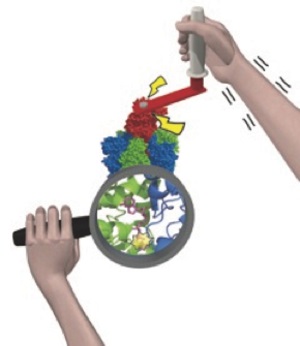TOPICS
- Award-Faculty
- 2014
Professor Noji wins The 30th Inoue Prize for Science (2013)
Professor Noji at Department of Applied Chemistry, wins The 30th Inoue Prize for Science (2013).
The Inoue Foundation for Science has been awarding the Inoue Prize for Science and the Inoue Research Award for Young Scientists since 1984 when the foundation was established and has been awarding the Inoue Science Research Award since 2009.The 30th Inoue Prize for Science (award certificate, gold medal, and a supplementary prize of 2 million yen) was awarded to a researcher younger than 50 years for his/her remarkable achievements in fundamental research of natural science.We asked 132 people, including the former members of the selection committee in 36 scientific societies concerned and of this foundation and former Inoue Prize for Science winners, to recommend candidates. Then, twenty-five candidates were nominated and screened. The selection committee finally shortlisted five researchers.
[About the Award-Winning Study]
The award-winning study by Prof. Noji showed that ATP synthase, which is a powerhouse that produces the energy currency of the cell, adenosine triphosphate (ATP), was the “molecular motor” that physically rotates the inner subunit complex as the rotor shaft upon the catalytic reaction. Prof. Noji also proved that the physical rotation of the rotary shaft is tightly coupled with the catalytic reaction; when the rotary shaft is forcibly rotated with external force, ATP synthase catalyzes ATP synthesis reaction or the reverse reaction, ATP hydrolysis reaction depending on the rotation direction. Thus, the energy conversion between physical rotation and chemical reaction is a concrete entity, not virtual, which is currently being established as biological common sense. In addition, during theses studies, we developed an array of ultra-small test tubes for single-molecule enzymatic assays in collaboration with researchers of the micro electro mechanical systems (MEMS), which has had a great impact in the fields of nanoscience, and analytical chemistry. These facts were highly appreciated. (Extracted from the statements of reasons for winning the Inoue Prize for Science)

[My Wishes for Future and My Thoughts on Winning the Prize]
I strongly believe that I was fortunate to receive this prize because I got the opportunity to work with very talented individuals. I am grateful to my teachers who guided me in my school days and to the excellent researchers of my generation with whom I was able to work. I am still surrounded by sincere students who have achieved a high level of academic excellence, and exceptionally excellent staffs that provide the great environment for me.In the future, I will continue to work hard both toward egoistic fundamental research based on my curiosity and toward applied research based on the results of fundamental research which will be passed on society. Furthermore, I will educate talented individuals who will play an active part in academia.

